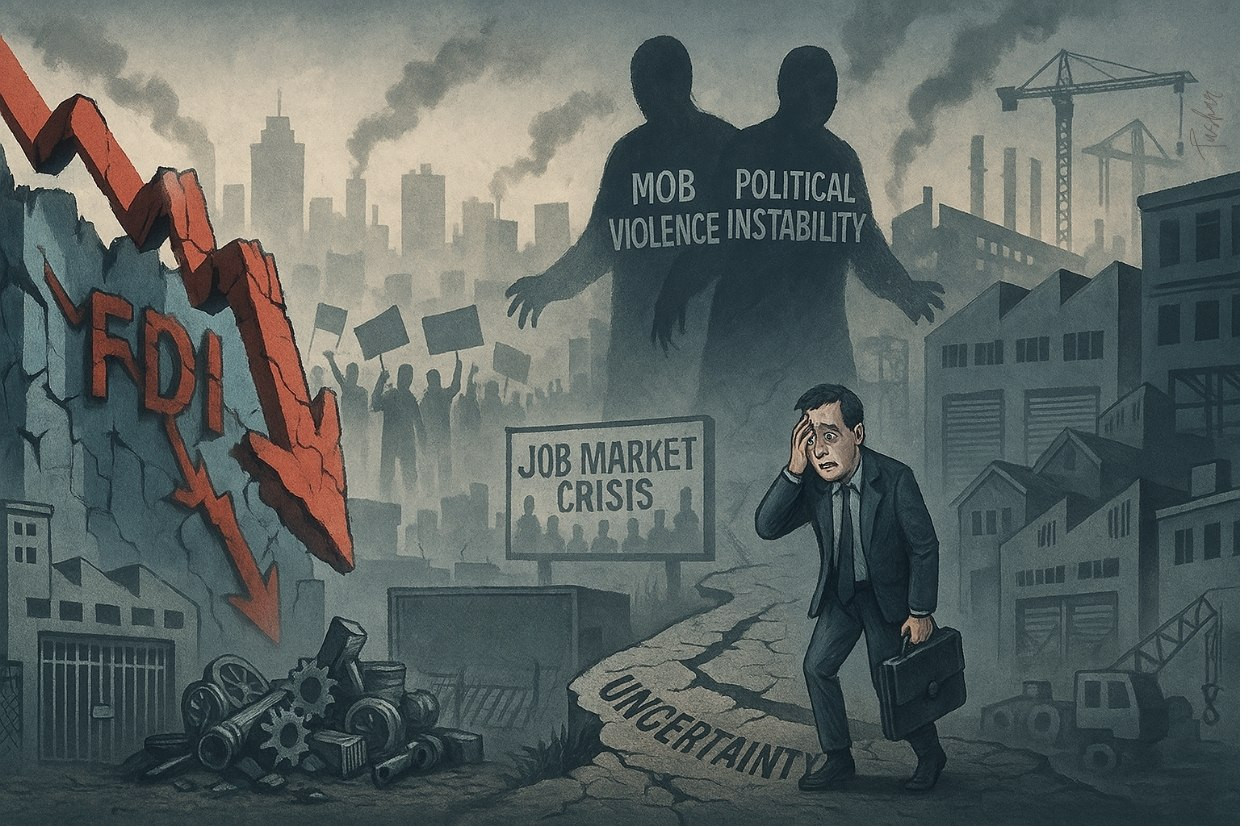Special Correspondent
Published:2025-07-06 23:41:19 BdST
Investment hits rock bottom amid political uncertainty
The country’s investment climate has hit a 14-year low as prolonged political instability and mob violence continue to disrupt law and order following the July uprising.
While protests persist across the country demanding various rights, labour unrest in industrial zones and an atmosphere of fear created by mob violence have pushed investors—both foreign and domestic—into a state of uncertainty. Upcoming national elections have only added to the unease, contributing to a sharp fall in investor confidence.
Foreign Direct Investment (FDI) in Bangladesh declined to $910 million during July–April of the outgoing FY2024–25, down from $1.27 billion during the same period in the previous year.
According to Bangladesh Bank data, total FDI in FY2023–24 stood at $1.41 billion, compared to $1.60 billion in FY2022–23 and $1.71 billion in FY2021–22.
The decline is even starker when compared to the pre-COVID period, with FDI reaching $3.48 billion in FY2018–19. This marks the lowest level of foreign investment since FY2011–12, when it stood at $1.2 billion.
A further 28% drop in foreign and reinvested capital during the July–April period this fiscal year has placed Bangladesh behind other South Asian economies in attracting investment.
Following the fall of the Awami League government in August 2024, the country witnessed a deterioration in law and order. Incidents of mob violence surged and have remained largely uncontrolled. The unstable political environment and unrest have driven foreign investors away, analysts say.
According to the central bank, FDI inflow in the first quarter of FY2024–25 was only $104.3 million, while total inflow in the first six months stood at $590 million. Direct foreign investment during this period was $210 million, a 37% drop from $330 million a year earlier. Reinvestment, however, remained comparatively higher at around $400 million.
Amid rising inflation, import restrictions, dollar shortages, and a weakening law enforcement structure, many existing businesses are struggling. The combined effect has led to stagnation in both foreign and local investments.
High interest rates have further discouraged new investment. The lending rate currently stands at 16%, making new ventures less viable. During July–May of FY2024–25, private sector credit growth was only 6.95%, far below the usual average of over 10%.
Letters of credit (LCs) opened for capital machinery imports dropped by 27%, while LC settlements fell by 22%, further confirming the slowdown in industrial investment.
According to Bangladesh Investment Development Authority (BIDA), the country attracted $12.85 billion in investment in FY2010–11, generating over 500,000 jobs. However, in FY2020–21, only $7.99 billion was invested, creating about 180,000 jobs.
Despite expectations of a rebound after the July uprising, both local and foreign investments have declined. Even domestic investments—traditionally the main driver of job creation—have not gained momentum.
Economists and business leaders believe restoring investor confidence is crucial. Long-term policies and political stability, expected under an elected government, could revive the country’s investment outlook.
According to the latest report by the International Finance Corporation (IFC), five major obstacles continue to hinder investment in Bangladesh: unreliable electricity, limited financing options, corruption, dominance of the informal sector, and high tax rates.
Rupali Chowdhury, former president of the Foreign Investors’ Chamber of Commerce and Industry (FICCI) said, “Not just foreign, even domestic investment is declining. The country is going through a transition, leading to policy uncertainty. Investors are watching the situation closely instead of committing new capital.”
She further said that despite commitments made during the April Investment Summit, many investors are delaying action due to the fragile economic indicators.
M Masrur Reaz, Chairman and CEO of Policy Exchange Bangladesh, said, “Macroeconomic stress and inflation have made it difficult to scale up investment. A year-long political crisis has hurt investor sentiment, and the wait for a transition from interim to elected government is fuelling uncertainty.”
Unauthorized use or reproduction of The Finance Today content for commercial purposes is strictly prohibited.


